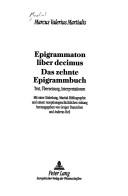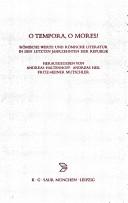| Listing 1 - 10 of 17 | << page >> |
Sort by
|
Book
ISBN: 9789004244535 9004244530 9004251448 Year: 2013 Volume: 357 Publisher: Leiden: Brill,
Abstract | Keywords | Export | Availability | Bookmark
 Loading...
Loading...Choose an application
- Reference Manager
- EndNote
- RefWorks (Direct export to RefWorks)
In four separate studies, Andreas Heil shows that Seneca, in his tragedies Thyestes , Hercules furens , Troas ( Troades ) and Medea , handles dramatic time less experimentally than has been assumed before. In all of these plays, taking into consideration the accompanying action on the stage and the characters' respective points of view, a gradually developing plot can be reconstructed. Thus, the survey considerably deepens our understanding of Seneca's dramatic technique. In vier Einzelstudien zeigt Andreas Heil, daß Seneca mit der dramatischen Zeit in seinen Tragödien Thyestes , Hercules furens , Troas ( Troades ) und Medea weniger experimentell verfährt, als bislang angenommen wurde. In allen untersuchten Stücken läßt sich – berücksichtigt man die begleitende Bühnenhandlung und die jeweilige Figurenperspektive – eine sukzessive sich entwickelnde Handlung rekonstruieren. Die Untersuchung leistet somit einen wichtigen Beitrag zum besseren Verständnis der dramatischen Technik Senecas.
Seneca [Younger] --- Latin drama (Tragedy) --- Time in literature --- Tragédie latine --- Temps dans la littérature --- History and criticism. --- Histoire et critique --- Seneca, Lucius Annaeus, --- History and criticism --- Criticism and interpretation --- Tragédie latine --- Temps dans la littérature --- Seneca, Lucius Annaeus, - approximately 4 B.C.-65 A.D. --- Criticism and interpretation.
Book
ISBN: 3631398425 9783631398425 Year: 2002 Volume: 135 Publisher: Frankfurt am Main: Peter Lang,
Abstract | Keywords | Export | Availability | Bookmark
 Loading...
Loading...Choose an application
- Reference Manager
- EndNote
- RefWorks (Direct export to RefWorks)
Aeneas (Legendary character) --- Aeneas (Sagenfiguur) --- Enée (Personnage de légende) --- Dante Alighieri, --- Virgil --- Statius, P. Papinius --- Estacio --- Stace --- Statius, Papinius --- Statius, Publius Papinius --- Vergil --- Virgile --- Virgilio Máron, Publio --- Virgilius Maro, Publius --- Vergili Maronis, Publius --- Dante Alighieri --- Alighieri, Dante --- Dante, Alighieri --- Alih'eri, Dante --- Criticism and interpretation. --- Influence. --- Vergilius Maro, Publius --- Criticism and interpretation --- Influence --- Statius, P. Papinius (Publius Papinius) --- Virgilius Maro, Publius, --- Virgilio Marone, P., --- Vergilīĭ, --- Virgile, --- Vergílio, --- Wergiliusz, --- Vergilīĭ Maron, P. --- Vergilīĭ Maron, Publīĭ, --- Verhiliĭ Maron, P., --- Vergil, --- Virgilio, --- Virgilīĭ, --- Virgilius Maro, P., --- Virgil Maro, P., --- ווירגיל, --- וירגיליוס, --- ורגיליוס, --- מרו, פובליוס ורגיליוס, --- فرجيل, --- Pseudo-Virgil, --- Pseudo Virgilio, --- Virgilio Marón, Publio, --- Bhārjila, --- Vergilius Maro, P. --- Vergilius --- Virgilio Marone, P. --- Vergilīĭ --- Vergílio --- Wergiliusz --- Vergilīĭ Maron, Publīĭ --- Verhiliĭ Maron, P. --- Virgilio --- Virgilius Maro, P. --- Virgil Maro, P. --- Pseudo-Virgil --- Pseudo Virgilio --- Virgilio Marón, Publio --- Bhārjila --- Stat︠s︡iĭ, Publiĭ Papiniĭ --- Стаций, Публий Папиний --- Stazio --- Alihii︠e︡ri, Dante, --- Alaghieri, Dante, --- Aldigeri, Dante, --- Aligeri, Dante, --- Allighieri, Dante, --- Aligerius, Dantes, --- Aligheri, Dante, --- Alighieri, Dante, --- Alleghieri, Dante, --- Durante Alighieri, --- Tan-ting, --- Danding, --- Dāntī Alījyīrī, --- Alīyīrī, Dāntī, --- Dante Alih'i︠e︡ri, --- Dante, --- Dant Aligīeri, --- Aligīeri, Dant, --- Dantte, --- Tantte, --- Dantis Alagherius, --- Danthe Alighieri, --- Alighieri, Danthe, --- Dante Alig'i︠e︡ri, --- Alig'i︠e︡ri, Dante, --- Ailígiéirí, Dainté, --- Dantė Aligjeris, --- Dānté ʼAligiyéri, --- Makākavi Tāntē, --- Tāntē Alikiyari, --- Alikiyari, Tāntē, --- אליגיירי דנטי --- אליגירי, דנטי --- דאנטי אליגיירי --- דאנטי אליגיירי, --- דאנט, --- דנטה אליגיירי, --- דנטה אליגירי, --- דנטי אליגיארי, --- דנטי אליגירי, --- دانتى ألغييري --- دانتي أليجيري،, --- ダンテ, --- Данте Аліґгіері, --- Marone, Publio Virgilio
Book
ISBN: 9004251448 9789004251441 1299622119 9781299622111 9789004244535 9004244530 Year: 2013 Publisher: Leiden Boston Brill
Abstract | Keywords | Export | Availability | Bookmark
 Loading...
Loading...Choose an application
- Reference Manager
- EndNote
- RefWorks (Direct export to RefWorks)
In four separate studies, Andreas Heil shows that Seneca, in his tragedies Thyestes , Hercules furens , Troas ( Troades ) and Medea , handles dramatic time less experimentally than has been assumed before. In all of these plays, taking into consideration the accompanying action on the stage and the characters' respective points of view, a gradually developing plot can be reconstructed. Thus, the survey considerably deepens our understanding of Seneca's dramatic technique. In vier Einzelstudien zeigt Andreas Heil, daß Seneca mit der dramatischen Zeit in seinen Tragödien Thyestes , Hercules furens , Troas ( Troades ) und Medea weniger experimentell verfährt, als bislang angenommen wurde. In allen untersuchten Stücken läßt sich – berücksichtigt man die begleitende Bühnenhandlung und die jeweilige Figurenperspektive – eine sukzessive sich entwickelnde Handlung rekonstruieren. Die Untersuchung leistet somit einen wichtigen Beitrag zum besseren Verständnis der dramatischen Technik Senecas.
Latin drama (Tragedy) --- DRAMA / Ancient, Classical & Medieval --- History and criticism. --- Seneca, Lucius Annaeus, --- Seneca, Lucius Annaeus --- Seneca --- Annaeus Seneca, Lucius, --- Seneca, Annaeus, --- Seneca, --- Seneca, L. A. --- Seneca, Lucio Anneo, --- Seneka, --- Seneka, L. Annėĭ, --- Sénèque, --- סנקא, לוציוס אנאוס --- Pseudo-Seneca --- Criticism and interpretation. --- Latin drama (Tragedy) - History and criticism --- Seneca, Lucius Annaeus, - approximately 4 B.C.-65 A.D. - Criticism and interpretation
Book
ISBN: 9789004511347 9789004511354 9004511350 9004511342 Year: 2022 Publisher: Leiden ; Boston : Brill,
Abstract | Keywords | Export | Availability | Bookmark
 Loading...
Loading...Choose an application
- Reference Manager
- EndNote
- RefWorks (Direct export to RefWorks)
"This monograph examines the literary representation of encounters between the living and the dead in Homer and the Roman epic poets of the early imperial period. The focus is on one particular situation: a witness to the afterlife (e.g. Odysseus or the Sibyl) who narrates encounters with the dead that he or she cannot (it would appear) actually have seen. This insufficiently studied and intriguing motif, namely seemingly impossible eye-witness testimony, can already be traced in Homer and then with variations in Vergil, the Culex poet, Lucan, Silius Italicus, and Statius"--
Book
ISBN: 128364066X 3834825514 Year: 2012 Publisher: Wiesbaden : Springer Vieweg,
Abstract | Keywords | Export | Availability | Bookmark
 Loading...
Loading...Choose an application
- Reference Manager
- EndNote
- RefWorks (Direct export to RefWorks)
Andreas Heil beschreibt den ganzheitlichen Ansatz zur Anwendungsentwicklung für komplexe Software-Systeme im Web Engineering. Basierend auf dem WebComposition-Vorgehensmodell betrachtet der Autor einen iterativen Entwicklungsprozess – insbesondere für intelligente Umgebungen und verteilte Systeme. Im Vordergrund steht dabei die effiziente und kostengünstige Integration von Hard- und Softwarekomponenten unter Zuhilfenahme von Web-Technologien und dem Semantic Web. Das formale Beschreibungsverfahren WebComposition-Concurrency-System ermöglicht hierbei die effiziente Planung und Überwachung sowohl der Entwicklung als auch des operativen Betriebs des Systems.
Software engineering. --- Computer science. --- Software Engineering. --- Computer Science, general. --- Expert systems (Computer science) --- Application software --- Web sites. --- Development.
Book
ISBN: 9789004154612 9004154612 9789004217089 1306318858 9004217088 Year: 2013 Publisher: Leiden: Brill,
Abstract | Keywords | Export | Availability | Bookmark
 Loading...
Loading...Choose an application
- Reference Manager
- EndNote
- RefWorks (Direct export to RefWorks)
This new and important introduction to Seneca provides a systematic and concise presentation of this author’s philosophical works and his tragedies. It provides handbook style surveys of each genuine or attributed work, giving dates and brief descriptions, and taking into account the most important philosophical and philological issues. In addition, they provide accounts of the major steps in the history of their later influence. The cultural background of the texts and the most important problem areas within the philosophic and tragic corpus of Seneca are dealt with in separate essays.
Seneca, Lucius Annaeus, --- Criticism and interpretation --- Seneca [Younger] --- Sénèque, --- Critique et interprétation --- Criticism and interpretation. --- Seneca, Lucius Annaeus --- Sénèque --- Seneca --- Critique et interprétation. --- Annaeus Seneca, Lucius, --- Seneca, Annaeus, --- Seneca, --- Seneca, L. A. --- Seneca, Lucio Anneo, --- Seneka, --- Seneka, L. Annėĭ, --- Sénèque, --- סנקא, לוציוס אנאוס --- Pseudo-Seneca --- Seneca, Lucius Annaeus, - approximately 4 B.C.-65 A.D. - Criticism and interpretation --- Seneka, L. Ann�e�i, --- S�en�eque, --- Seneca, Lucius Annaeus, - approximately 4 B.C.-65 A.D.
Book
ISBN: 1283428997 9786613428998 3110213273 3110212986 Year: 2011 Publisher: De Gruyter, Inc.
Abstract | Keywords | Export | Availability | Bookmark
 Loading...
Loading...Choose an application
- Reference Manager
- EndNote
- RefWorks (Direct export to RefWorks)
This edited volume, which has its origins in a Collaborative Research Centre (Sonderforschungsbereich) in Dresden, "Institutionality and Historicity", deals with the relationship between Roman values and the political strategies and changing social roles of the early Principate as reflected in contemporary literary communication.
Latin literature --- History and criticism --- Rome --- Civilization. --- Politics and government --- Augustus. --- Roman Culture. --- Roman Literature. --- Roman Principate. --- Roman Values.

ISBN: 3631528213 Year: 2004 Volume: 148 Publisher: Frankfurt am Main [etc.] Peter Lang
Abstract | Keywords | Export | Availability | Bookmark
 Loading...
Loading...Choose an application
- Reference Manager
- EndNote
- RefWorks (Direct export to RefWorks)
Epigrams, Latin --- History and criticism --- Martial. --- Criticism and interpretation.
Book
ISBN: 9783825358433 Year: 2011 Volume: 11 Publisher: Heidelberg Universitätsverlag Winter
Abstract | Keywords | Export | Availability | Bookmark
 Loading...
Loading...Choose an application
- Reference Manager
- EndNote
- RefWorks (Direct export to RefWorks)
Festschrift - Libri Amicorum --- Classical philology --- Philology, Classical --- Classical antiquities --- Greek language --- Greek literature --- Greek philology --- Humanism --- Latin language --- Latin literature --- Latin philology --- Mutschler, Fritz-Heiner. --- China --- Civilization.

ISBN: 3598777205 3110943727 Year: 2003 Volume: 171 Publisher: München Leipzig K.G. Saur
Abstract | Keywords | Export | Availability | Bookmark
 Loading...
Loading...Choose an application
- Reference Manager
- EndNote
- RefWorks (Direct export to RefWorks)
Die zunehmende Auflösung der soziopolitischen Ordnung in der ausgehenden römischen Republik erfaßte auch das System allgemein verbindlicher Werte. Wie sich die literarische Kommunikation der Zeit zu dieser Entwicklung verhielt, untersuchen die hier versammelten Beiträge. Sie sind, wie bereits der Band 'Moribus antiquis res stat Romana' zur römischen Literatur des 3. und 2. Jhs. v. Chr. (BzA 134), aus dem Dresdner Sonderforschungsbereich 'Institutionalität und Geschichtlichkeit' hervorgegangen. Neben den literarischen Texten werden epigraphische und archäologische Zeugnisse berücksichtigt.
Latin literature --- History and criticism --- Values --- Inscriptions, Latin --- Valeurs (Philosophie) --- Littérature latine --- Inscriptions latines --- Histoire et critique --- Rome --- History --- Histoire
| Listing 1 - 10 of 17 | << page >> |
Sort by
|

 Search
Search Feedback
Feedback About UniCat
About UniCat  Help
Help News
News